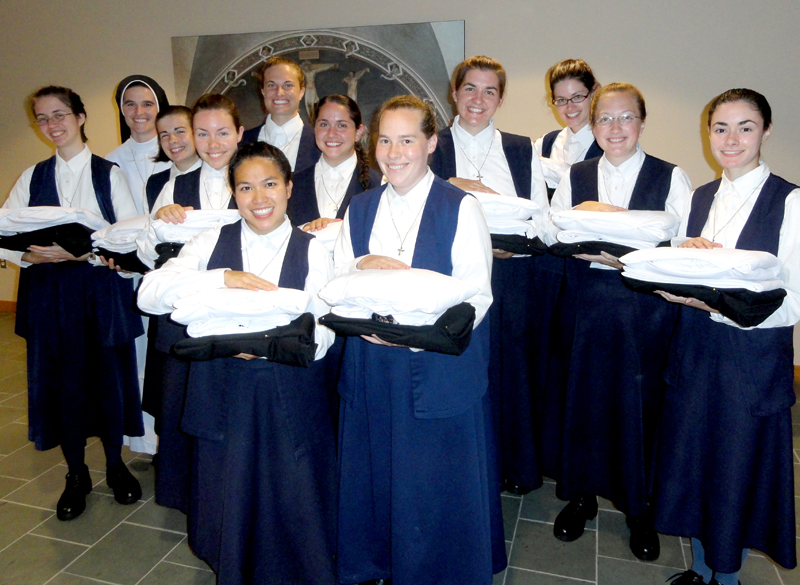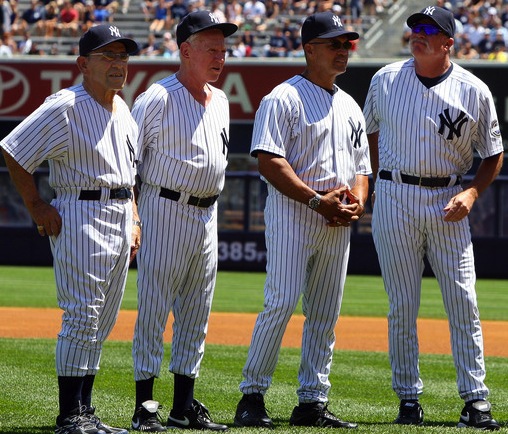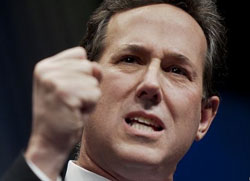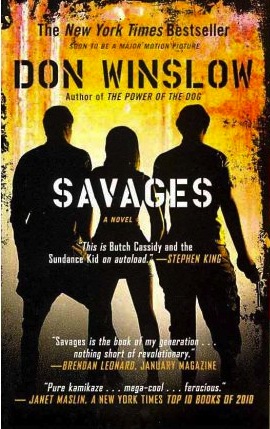
There’s a lot of war-talk going on, people wanting us to attack Iran. Santorum and Gingrich are just itching to go to war with Iran. It sounds eerily similar to the lead-up to the invasion of Iraq. Makes me wonder how much baloney we’re being fed this time, once again, to justify another invasion. And they talk as if it would be a cake-walk…just like Iraq was, right?
You can find many people with a more realistic approach, who will explain the real consequences of a war with Iran. That you can’t take out their nuclear program with a few surgical strikes. That a war with Iran could destabilize the whole region.
General Anthony Zinni, former chairman of the Joint Chiefs, is one such voice asking people to chill out. When people advocate attacking Iran, he said in a speech to the New America Foundation, he likes to respond, “And then what?”
After you’ve dropped those bombs on those hardened facilities, what happens next? What happens if they decide, in their hardened shelters with their mobile missiles, to start launching those? What happens if they launch them into U.S. bases on the other side of the Gulf? What happens if they launch into Israel, or somewhere else? Into a Saudi oil field? Into Ras Laffan, with all the natural gas?
What happens if they now flush their fast patrol boats, their cruise missiles…and they sink a tanker, an oil tanker? And of course the economy of the world goes absolutely nuts. What happens if they activate sleeper cells? The MOIS, the intelligence service — what happens if, in another preemptive attack by the West, the U.S. and Israel, they fire up the streets and now we got problems. Just tell me how to deal with all that, okay?
Because, eventually, if you follow this all the way down, eventually I’m putting boots on the ground somewhere. And like I tell my friends, if you like Iraq and Afghanistan, you’ll love Iran.
The other side is to ask, “Once Iran gets nuclear weapons, now what?” I guess I’m not one who assumes apocalyptic consequences whenever a country acquires nuclear weapons. The technology is out there. Japan, South Korea, Brazil, and South Africa could probably develop nuclear weapons overnight if they wanted to, and we probably wouldn’t object, because those are the Good Guys. But it’s going to spread to Bad Guys too. Some Bad Guys have them now–Russia, China, Pakistan, North Korea. More and more countries will develop nuclear weapons, because they can, and because voices will arise in their countries saying their national security demands it.
I don’t like, don’t like at all, what such a world looks like. Where country after country possesses nuclear weapons, and where the next party that takes power, whether driven by ideology or religion, might be far more inclined to use them. It’d be like walking down the street, and every other person is carrying an AK-47. At some point, they’re going to be used.
David Sanger’s 2009 book, “The Inheritance,” begins with four chapters about Iran. This is not a nice country. However, an air attack wouldn’t be the quick surgical strike everyone envisions–send a plane over, drop a bomb…done. Military experts told Sanger that taking out Iran’s nuclear capability would probably require a thousand strike sorties, with some of everything–air bombardment, cruise missiles, and multiple restrikes. After each day’s bombing, we would consult satellite photos to see if we’d gone deep enough, and then order up a new set of strikes for the next day. Probably for several weeks. Unfortunately, we couldn’t be sure that we got everything; there could be installations we’ve never learned about. And even if we did get everything, experts say it would just set back Iran’s nuclear program about two years. Then the fun would start all over.
Meanwhile, as we’re attacking Iran, they would not only be fighting back with far more ability than we faced in Iraq, but would probably be launching terror strikes at Americans around the world.
Before going to war, shouldn’t we exhaust all other options? With all due respect to Santorum and Gingrich, your feverish eagerness to show Iran who’s boss is severely misguided. I know, you’re all full of American swagger and bluster and relish carrying a Big Stick, and your right-wing base just eats up that stuff. But Obama’s measured stance, and his caution that this isn’t a casual game, is far more to my liking. It may still lead to war. But at least it’ll happen later rather than sooner.
So no, I don’t want Iran to have nuclear weapons. But it’s not CERTAIN that they would use them in any way beyond mere deterrence to hostile neighbors. I don’t want to get into another protracted war out of mere paranoia about what we THINK they might do with nuclear weapons. Even though a regime like the current one in Iran certainly gives paranoia credence.
If there’s any chance we could settle into detente, or maybe even, given enough time, become something resembling friendly–that’s what I want. Rather than making a decision, based on machismo, that causes hundreds or thousands of Americans to come home in body bags and further cripples our economic future.
1 Comment




 I don’t know how many recipes the Bible contains, but Exodus 30 gives one for sacred anointing oil.
I don’t know how many recipes the Bible contains, but Exodus 30 gives one for sacred anointing oil.
 I don’t know why Americans think we should never apologize for anything. That’s not courteous, and it’s certainly not Christian. I was always taught that it takes the bigger man to make things right. I like to think that when it comes to morality, there is no bigger man on the world stage than America. People say apologizing is a sign of weakness. No, it’s a sign of strength.
I don’t know why Americans think we should never apologize for anything. That’s not courteous, and it’s certainly not Christian. I was always taught that it takes the bigger man to make things right. I like to think that when it comes to morality, there is no bigger man on the world stage than America. People say apologizing is a sign of weakness. No, it’s a sign of strength. There are things I like that Obama has done, and things I dislike. I assembled, piecemeal, a list of each over the last few months. Let’s start with the dislikes.
There are things I like that Obama has done, and things I dislike. I assembled, piecemeal, a list of each over the last few months. Let’s start with the dislikes. Those are some of my complaints. On the positive side, I’ll cite the following. I recognize that with each one, naysayers can denigrate it by saying he doesn’t deserve the credit or it wasn’t a good thing after all, or otherwise write it off. But these are, indeed, things that have happened on Obama’s watch.
Those are some of my complaints. On the positive side, I’ll cite the following. I recognize that with each one, naysayers can denigrate it by saying he doesn’t deserve the credit or it wasn’t a good thing after all, or otherwise write it off. But these are, indeed, things that have happened on Obama’s watch. Colson said he was often criticized for not getting strongly involved in fighting abortion. He agreed that it was a terrible evil. However, he said, God gives different people different agendas. The agenda he’d been given was prison ministry, and he had thrown himself fully into that agenda. He applauded those who crusaded against abortion. But, he said, “That’s not the agenda God gave me.”
Colson said he was often criticized for not getting strongly involved in fighting abortion. He agreed that it was a terrible evil. However, he said, God gives different people different agendas. The agenda he’d been given was prison ministry, and he had thrown himself fully into that agenda. He applauded those who crusaded against abortion. But, he said, “That’s not the agenda God gave me.”




